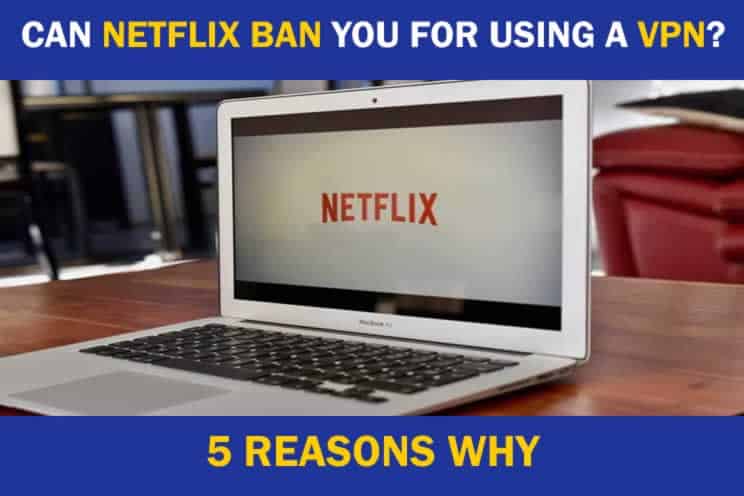
When I was in the US, I noticed Netflix had newer films compared to Netflix back home. I decided to find out if I could use a VPN back home to connect to Netflix in the US without being banned.
Can Netflix ban you for using a VPN? Netflix won’t ban customers who use a VPN to make connections to different Netflix regions other than their own. Instead if Netflix’s systems detect VPN use, the number of films available can be severely limited to films only available across all Netflix regions.
Netflix is under pressure from the copyright holders of the programs it shows to ensure they are only shown in the regions they are licensed for. As a result certain measures can be taken by Netflix against customers who use a VPN to connect to a different region.
1. Netflix values their customers
Netflix values their customers as it tries to keep hold of its subscribers and generate decent levels of income to keep its shareholders and investors happy.
Banning customers and losing out on a subscriber to a competitor like Disney+ or Amazon Prime TV, is something they would not readily do, even if you use a VPN to connect. Netflix will only ban subscribers as a last resort, such as failing to pay their subscription over a prolonged period.
Netflix has been put under pressure by the copyright holders of the films and shows Netflix broadcasts to make sure they only are shown in the region in which they are licensed for.
So, films and shows licensed for the USA and not licensed for Europe, cannot be made available for European Netflix customers. When people started using VPNs to get around this geo-restriction, the copyright holders put pressure on Netflix to do something about it and whilst it was easy for the copyright holder to ask for these VPN using customers to be banned, this would not be a good idea for Netflix as they would lose revenue.
The copyright holders have already agreed a license fee, and this would not change if Netflix lost subscribers by banning them for using VPNs. So, Netflix needed to become smarter in trying to persuade customers not to use VPNs and access content in different regions which wasn’t license for the region they live in.
2. Netflix is getting smarter identifying VPNs
Netflix has been getting smarter in identifying IP addresses associated with VPNs, so it knows when one of its customers connects to them, they are actually connecting through a VPN and not their real IP address (check out VPNs that could work with Netflix here).
It’s almost become an arms race in IP addresses, as the VPNs try to outsmart Netflix by using different IP addresses but eventually Netflix does seem to catch up and identify the majority of its customers connecting using a VPN.
Once Netflix blacklists an IP address associated with a VPN service provider, it doesn’t necessarily ban the connection on that IP address. I have connected using my VPN service provider and my Netflix experience has instantly indicated that Netflix knows I’m using a VPN.
Sometimes there’s a warning saying along the lines of ‘ Whoops, something went wrong. … You seem to be using an unblocker or proxy’ and at other times there’s no warning but tell-tale signs Netflix knows I’m using a VPN. Netflix slows down the user experience and can lower the quality of streaming for VPN users.
3. Netflix can slow down the user experience for VPNs
When I’ve connected using a VPN and not got a warning about me using a VPN, my Netflix experience has slowed down considerably. From when I select my user on the start screen to how long it took Netflix to populate the movies and shows available, with many title tiles being blank.
At first I thought this was probably down to latency in my VPN connection but I noticed the only films showing up were some of the older titles, almost as if Netflix was selectively not allowing the newer stuff including the titles in the VPN region I’d connected to from appearing.
In the end, I disconnected my VPN and connected without a VPN. So, I didn’t get to see a film in a different region, but I did get to access any of the films and shows available in my region.
4. Netflix can lower streaming quality for VPNs
When I’ve been able to connect and Netflix has been unable to work out I’m using a VPN, the user experience and streaming quality has been as good as expected but then I found on some occasions when I’ve connected to Netflix, after selecting a movie.
The streaming seemed lesser and slower even though the latency on the VPN connection was within tolerable ranges, almost as though the streaming was being deliberately affected by Netflix. I can’t validate this, but I think, it’s a good trick from Netflix, if they can do this to put off their customer from using a VPN.
5. Netflix uses VPN leaks for customer location
Sometimes poorer quality VPNs services can leak the real IP address instead of using the VPN assigned IP address. This stops the VPN from being able to trick Netflix to believe the connection is coming from a different region and Netflix instead, knows the real IP address.
Netflix will then display all movies and shows in the region associated with the customer’s real IP address and not the VPN assigned IP address,
VPN Limited to your device
When I do get a good connection and the VPN IP address is still relatively unknown to Netflix, I can’t cast Netflix to my TV. I don’t like watching Netflix on my smart phone unless I’m travelling and not being able to cast my smartphone (which is also on the same Wi-Fi network as my television) to my television.
This is because as all information is tunnelled out through the VPN connection and my smartphone can’t see my TV being on the same network, as even though they are both on the same Wi-Fi network, my phone is one a different network within the Wi-Fi connection, created by the VPN, so there’s no way of casting.
I did look at setting up a VPN router on a Linux computer and then making sure all my Wi-Fi traffic was routed through this computer after it left my Wi-Fi access point, so anything in my house connecting to the internet would be using the VPN router.
I was still unable to get the casting to work, as I think it needs to be a local Wi-Fi network, so gave up as I didn’t have anytime to investigate further.
Netflix bypassing VPNs
Some VPNs can get past the Netflix VPN issues by using many different IP addresses, making it difficult for Netflix to keep up to date and for those who want to watch Netflix shows from a different region, these VPNs make sense.
Eventually, Netflix will catch up with these new IP addresses from the VPNs and put some form of restriction on them as discussed earlier but the VPN providers are always a step ahead and simply get hold of more IP addresses, that Netflix is unaware of at the time.
Netflix suspicious activity email
There are many scams involving tricking Netflix customers into believing their Netflix account has been suspended and they have effectively been banned from using Netflix.
The Netflix customer is sent an email or a SMS message purporting to be from Netflix with the message of them being banned for using a VPN and asked to click a link to either get their Netflix account unlocked or to find out why they have been banned.
When the Netflix customer clicks on the link, they are sent to a website to all intents and purposes looks like the Netflix website but in reality it’s a fake website.
When the Netflix customer enters their credentials to login, their username and password fails or is redirected to an information page about maintenance or high volumes of traffic being experienced, which has led to the website being unavailable. When in fact, the credentials have been inadvertently stolen when the Netflix customer tried to log into the fake website.
It’s vitally important not to believe any of these emails or SMS text messages from Netflix trying to phish for your Netflix credentials, the first place to check if you have been banned, is to see if you can still access the service. Then use the real contact channels on the Netflix website to speak to someone at Netflix if there is a problem with your account.
Conclusion
Whilst Netflix probably won’t ban their customers for using VPNs they will try to make the VPN experience as painful as possible by either:
- blocking the VPN service providers IP address as part of their blacklisted IP addresses;
- letting the customer know they suspect they are using a VPN or they will make the Netflix user experience difficult enough for their customer to switch off their VPN.
There are VPN service providers priding themselves on being able to beat the Netflix VPN blocking by being able to provide many more IP addresses and frequently change these, so Netflix simply can’t keep up.
Related Questions:
Is it illegal to use a VPN for Netflix? No, it’s not illegal but it is against the Netflix terms and conditions. Netflix doesn’t like VPNs being configured to access content from a different reason, as Netflix is only licensed to show films to people in specific regions.
Does Netflix know if you use a VPN? Netflix are putting in more efforts to work out if their customers are using VPNs by regularly finding out more IP addresses used by VPNs and restricting them.

